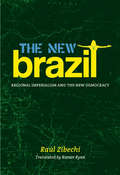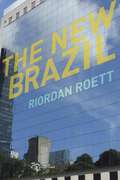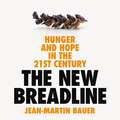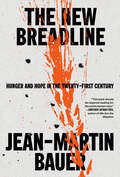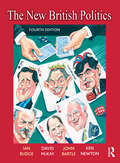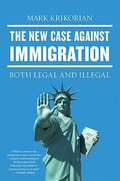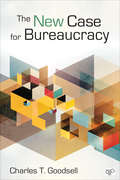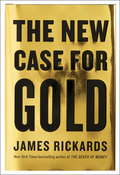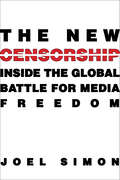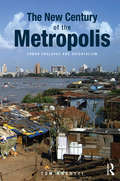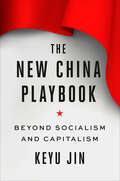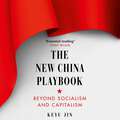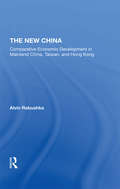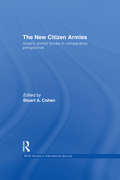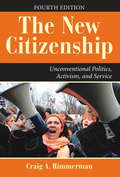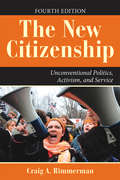- Table View
- List View
The New Brazil
by Ramor Ryan Raúl ZibechiIn the midst of a rapidly shifting global economy, Brazil has emerged as a powerful new player on the geopolitical stage. Against all odds, the Latin American nation managed, in just three years, to repay a 2002 $15.5 billion IMF bailout loan thanks to aggressive economic restructuring and a series of alliances that have placed it at the center of political and economic power in the region.From the outside, Brazil is a poster child for neoliberal capitalism. Yet inside the country, the lives of the Brazilian people are still marked by vast inequities in wealth and access to social services--a striking disparity with the nation's newfound power in the global economy. In June of 2013, protests against the increasing costs of public transportation swelled to mass demonstrations against the Rousseff government's failure to address this disparity, leading many to wonder whether the popular movements in Brazil may be just powerful enough to shift the nation's influence towards a wholly new economic model based in regional integration.The New Brazil explores this disparity. Will the nation serve as the glue that holds together the Latin American states, distancing themselves from the neoliberalism of the United States and Canada? Or will Brazil simply become another world superpower, able to subject the rest of Latin American to its will? Only time will tell.Raul Zibechi is a journalist and social-movement analyst based in Montevideo, Uruguay. He is the author of numerous books including Dispersing Power and Territories in Resistance, both published by AK Press.
The New Brazil
by Riordan RoettThe New Brazil tells the story of South America's largest country as it evolved from a remote Portuguese colony into a regional leader; a respected representative for the developing world; and, increasingly, an important partner for the United States and the European Union.In this engaging book, Riordan Roett traces the long road Brazil has traveled to reach its present status, examining the many challenges it has overcome and those that lie ahead. He discusses the country's development as a colony, empire, and republic; the making of modern Brazil, beginning with the rise to power of Get?lio Vargas; the advent of the military government in 1964; the return to civilian rule two decades later; and the pivotal presidencies of Fernando Henrique Cardoso and Luiz In?cio (Lula) da Silva, leading to the nation's current world status as one of the BRIC countries.Under newly elected President Dilma Rousseff, much remains to be done to consolidate and expand its global role. Nonetheless, as a player on the world stage, Brazil is here to stay."In part the [country's] success is due to external factors such as the high demand for Brazilian exports, particularly in China and the rest of Asia. But it also reflects sophisticated policy choices, including inflation targeting and maintenance of an autonomous central bank."--from the Introduction
The New Brazil
by Riordan RoettThe New Brazil tells the story of South America's largest country as it evolved from a remote Portuguese colony into a regional leader; a respected representative for the developing world; and, increasingly, an important partner for the United States and the European Union.In this engaging book, Riordan Roett traces the long road Brazil has traveled to reach its present status, examining the many challenges it has overcome and those that lie ahead. He discusses the country's development as a colony, empire, and republic; the making of modern Brazil, beginning with the rise to power of Getúlio Vargas; the advent of the military government in 1964; the return to civilian rule two decades later; and the pivotal presidencies of Fernando Henrique Cardoso and Luiz Inácio (Lula) da Silva, leading to the nation's current world status as one of the BRIC countries.Under newly elected President Dilma Rousseff, much remains to be done to consolidate and expand its global role. Nonetheless, as a player on the world stage, Brazil is here to stay."In part the [country's] success is due to external factors such as the high demand for Brazilian exports, particularly in China and the rest of Asia. But it also reflects sophisticated policy choices, including inflation targeting and maintenance of an autonomous central bank."-from the Introduction
The New Breadline: Hunger and Hope in the 21st Century
by Jean-Martin BauerThe face of hunger is changing. Since the Covid pandemic and Russia's invasion of Ukraine, even the West is experiencing a level of food insecurity not seen for generations. Climate change is already resulting in food-related migration, and the world will soon see significant shifts in the location of arable land.The New Breadline is a call to action on the issues of food aid, food security and climate justice, told from the frontlines of hunger. Jean-Martin Bauer eloquently dissects inequity and racism in the humanitarian system, drawing on his Haitian childhood and his career as an aid worker, asking: when decisions about food are beingmade, who isn't at the table? Urgent, incisive and full of compassion, this is the human story of hunger.Urgent, incisive, and full of compassion, this is the human story of hunger.
The New Breadline: Hunger and Hope in the Twenty-First Century
by Jean-Martin BauerA humanitarian leader with more than two decades of experience working for the United Nations takes aim at the global food crisis—revealing how hunger anywhere affects lives everywhere and what steps we can take to change course."This book should be required reading for the entire human race." —Jonathan Safran Foer, author of We Are the WeatherAt the turn of the twenty-first century, more than 150 countries pledged to eradicate hunger by 2030. But with only a few years left, we&’re far from reaching that goal. Instead, hunger is on the rise—America itself recently experienced levels of food insecurity not seen since the Great Depression. How could the richest nation in the world have so many people going hungry?In The New Breadline, aid worker and activist Jean-Martin Bauer unravels this paradox. Bauer&’s family fled to America during the terrors of the Duvalier dictatorship in Haiti. Now on the brink of mass starvation, Haiti and its grim history inspired Bauer to make food justice his life's work. During his long career with the UN, Bauer learned firsthand that the problem of hunger is always political—and like all political conditions, hunger, he knew, was something we could work to change.Drawing from his fieldwork in the most hunger-prone countries across the globe—from Haiti, where elites hoard imported French cheese, to Madagascar, where foreign corporations are snatching up valuable land from local farmers, to right here in America, where the lines at food banks continue to grow—Bauer weaves profound personal insight with a keen understanding of the structural systems of racism, classism, and sexism that thwart true progress in the battle against hunger. The New Breadline is an inspiring call to action to end what he persuasively argues is one of the greatest threats to our society, boldly envisioning a world where we can always feed ourselves and one another.
The New British Politics
by John Bartle Kenneth Newton David Mckay Ian BudgeThe New British Politics is one of the most comprehensive and successful introductions to British politics ever published. Now available in a fully revised and updated fourth edition, this clear, lively and authoritative text has an emphasis on law and order and the historical context of British politics. Written by internationally-known specialists, the book combines incisive and original analysis with direct presentation.
The New Cambridge History of American Foreign Relations, Volume 2
by Walter LafeberSince their first publication, the four volumes of the Cambridge History of American Foreign Relations have served as the definitive source for the topic, from the colonial period to the Cold War. This second volume of the updated edition describes the causes and dynamics of United States foreign policy from 1865 to 1913, the era when the United States became one of the four great world powers and the world's greatest economic power. The dramatic expansion of global power during this period was set in motion by the strike-ridden, bloody, economic depression from 1873 to 1897 when American farms and factories began seeking overseas markets for their surplus goods, as well as by a series of foreign policy triumphs, as America extended its authority to Cuba, Puerto Rico, the Panama Canal Zone, Central America, the Philippines and China. Ironically, as Americans searched for opportunity and stability abroad, they helped create revolutions in Central America, Panama, the Philippines, Mexico, China and Russia.
The New Cambridge History of American Foreign Relations: Volume 1, Dimensions of the Early American Empire, 1754–1865
by William Earl WeeksSince their first publication, the four volumes of the Cambridge History of American Foreign Relations have served as the definitive source for the topic, from the colonial period to the Cold War. This entirely new first volume narrates the British North American colonists' preexisting desire for expansion, security, and prosperity, and argues that these desires are both the essence of American foreign relations and the root cause for the creation of the United States. They required the colonists to unite politically, as individual colonies could not dominate North America by themselves. Although ingrained localist sentiments persisted, a strong, durable Union was required for mutual success, thus American nationalism was founded on the idea of allegiance to the Union. Continued tension between the desire for expansion and the fragility of the Union eventually resulted in the Union's collapse and the Civil War.
The New Cambridge History of American Foreign Relations: Volume 3, The Globalizing of America, 1913–1945
by Akira IriyeSince their first publication, the four volumes of The Cambridge History of American Foreign Relations have served as the definitive source for the topic, from the colonial period to the Cold War. This third volume of the updated edition describes how the United States became a global power – economically, culturally and militarily – during the period from 1913 to 1945, from the inception of Woodrow Wilson's presidency to the end of the Second World War. The author also discusses global transformations, from the period of the First World War through the 1920s when efforts were made to restore the world economy and to establish a new international order, followed by the disastrous years of depression and war during the 1930s, to the end of the Second World War. Throughout the book, themes of Americanisation of the world and the transformation of the United States provide the background for understanding the emergence of a trans-national world in the second half of the twentieth century.
The New Cambridge History of American Foreign Relations: Volume 4, Challenges to American Primacy, 1945 to the Present
by Warren I. CohenSince their first publication, the four volumes of the Cambridge History of American Foreign Relations have served as the definitive source for the topic, from the colonial period to the Cold War. The fourth volume of the updated edition explores the conditions in the international system at the end of World War II, the American determination to provide leadership, and the security dilemma each superpower posed for the other. This revised and expanded edition incorporates recent scholarship and revelations, carrying the narrative through the years following the end of the Cold War into the administration of Barack Obama. The character of the American political system is explored, including the separation of political powers and the role of interest groups that prompted American leaders to exaggerate dangers abroad to enhance their domestic power. This new edition examines the conditions in the international system from the end of World War II to the present, focusing on the American determination to provide world leadership.
The New Case Against Immigration
by Mark KrikorianNew research reveals why America can no longer afford mass immigrationMark Krikorian has studied the trends and concluded that America must permanently reduce immigration- both legal and illegal-or face enormous problems in the near future. His argument is based on facts, not fear. Wherever they come from, today's immigrants are actually very similar to those who arrived a century ago. But they are coming to a very different America-one where changes in the economy, society, and government create different incentives for newcomers. Before the upheavals of the 1960s, the U. S. expected its immigrants-from Italy to India-to earn a living, learn English, and become patriotic Americans. But the rise of identity politics, political correctness, and Great Society programs means we no longer make these demands. In short, the problem isn't them, it's us. Even positive developments such as technological progress hinder the assimilation of immigrants. It's easy now for newcomers to live "transnational" lives. Immigration will be in the headlines through Election Day and beyond, and this controversial book will help drive the debate.
The New Case for Bureaucracy
by Charles T. GoodsellCharles Goodsell has long taken the position that U.S. bureaucracy is neither a generalized failure nor sinkhole of waste as mythologized by anti-government ideologues. Rather, it is one of the most effective and innovate sets of administrative institutions of any government in the world today. Indispensable to our democracy, it keeps government reliable and dependable to the citizens it serves. However, The New Case for Bureaucracy goes beyond empirically verifying its quality. Now an extended essay, written in a conversational tone, Goodsell expects readers to form their own judgments. At a time when Congress is locked in partisan and factional deadlock, he argues for the increased importance of bureaucrats and discusses how federal agencies must battle to keep alive in terms of resources and be strong enough to retain the integrity of their missions. While bureaucracy is not a substitute for policymaking by elected officials, it keeps the machinery of government running smoothly to meet the ever changing needs of the country, despite the challenges of federal sequester and shutdown.
The New Case for Bureaucracy
by Charles T. GoodsellCharles Goodsell has long taken the position that U.S. bureaucracy is neither a generalized failure nor sinkhole of waste as mythologized by anti-government ideologues. Rather, it is one of the most effective and innovate sets of administrative institutions of any government in the world today. Indispensable to our democracy, it keeps government reliable and dependable to the citizens it serves. However, The New Case for Bureaucracy goes beyond empirically verifying its quality. Now an extended essay, written in a conversational tone, Goodsell expects readers to form their own judgments. At a time when Congress is locked in partisan and factional deadlock, he argues for the increased importance of bureaucrats and discusses how federal agencies must battle to keep alive in terms of resources and be strong enough to retain the integrity of their missions. While bureaucracy is not a substitute for policymaking by elected officials, it keeps the machinery of government running smoothly to meet the ever changing needs of the country, despite the challenges of federal sequester and shutdown.
The New Case for Gold
by James Rickards**USA Today bestseller and Wall Street Journal business bestseller**They say John Maynard Keynes called gold a "barbarous relic." They say there isn't enough gold to support finance and commerce. They say the gold supply can't increase fast enough to support world growth. They're wrong. In this bold manifesto, bestselling author and economic commentator James Rickards steps forward to defend gold--as both an irreplaceable store of wealth and a standard for currency. Global political instability and market volatility are on the rise. Gold, always a prudent asset to own, has become the single most important wealth preservation tool for banks and individuals alike. Rickards draws on historical case studies, monetary theory, and personal experience as an investor to argue that: * The next financial collapse will be exponentially bigger than the panic of 2008. * The time will come, sooner rather than later, when there will be panic buying and only central banks, hedge funds, and other big players will be able to buy any gold at all. * It's not too late to prepare ourselves as a nation: there's always enough gold for a gold standard if we specify a stable, nondeflationary price. Providing clear instructions on how much gold to buy and where to store it, the short, provocative argument in this book will change the way you look at this "barbarous relic" forever.From the Hardcover edition.
The New Censorship: Inside the Global Battle for Media Freedom (Columbia Journalism Review Books)
by Joel SimonJournalists are being imprisoned and killed in record numbers. Online surveillance is annihilating privacy, and the Internet can be brought under government control at any time. Joel Simon, the executive director of the Committee to Protect Journalists, warns that we can no longer assume that our global information ecosystem is stable, protected, and robust. Journalists are increasingly vulnerable to attack by authoritarian governments, militants, criminals, and terrorists, who all seek to use technology, political pressure, and violence to set the global information agenda.Reporting from Pakistan, Russia, Turkey, Egypt, and Mexico, among other hotspots, Simon finds journalists under threat from all sides. The result is a growing crisis in information—a shortage of the news we need to make sense of our globalized world and fight human rights abuses, manage conflict, and promote accountability. Drawing on his experience defending journalists on the front lines, he calls on "global citizens," U.S. policy makers, international law advocates, and human rights groups to create a global freedom-of-expression agenda tied to trade, climate, and other major negotiations. He proposes ten key priorities, including combating the murder of journalists, ending censorship, and developing a global free-expression charter to challenge the criminal and corrupt forces that seek to manipulate the world's news.
The New Censorship: Inside the Global Battle for Media Freedom (Columbia Journalism Review)
by Joel SimonAn examination of how the media is under fire and how to safeguard journalists and the information they seek to share with the public.Journalists are being imprisoned and killed in record numbers. Online surveillance is annihilating privacy, and the Internet can be brought under government control at any time. Joel Simon, the executive director of the Committee to Protect Journalists, warns that we can no longer assume that our global information ecosystem is stable, protected, and robust. Journalists are increasingly vulnerable to attack by authoritarian governments, militants, criminals, and terrorists, who all seek to use technology, political pressure, and violence to set the global information agenda.Reporting from Pakistan, Russia, Turkey, Egypt, and Mexico, among other hotspots, Simon finds journalists under threat from all sides. The result is a growing crisis in information—a shortage of the news we need to make sense of our globalized world and fight human rights abuses, manage conflict, and promote accountability. Drawing on his experience defending journalists on the front lines, he calls on &“global citizens,&” U.S. policy makers, international law advocates, and human rights groups to create a global freedom-of-expression agenda tied to trade, climate, and other major negotiations. He proposes ten key priorities, including combating the murder of journalists, ending censorship, and developing a global free-expression charter to challenge the criminal and corrupt forces that seek to manipulate the world's news.&“Wise and insightful. [Simon] offers hope to all who care about maintaining the free flow of information in a world full of would-be censors.&”—Ann Cooper, Columbia Journalism School
The New Century of the Metropolis: Urban Enclaves and Orientalism
by Tom AngottiThe problems created by metropolitanization have become increasingly apparent. Attempts to limit growth, disperse populations and plan neighbourhoods have been largely unsuccessful. Strategies are needed to improve the world's major cities in the twenty-first century. Tom Angotti is fundamentally optimistic about the future of the metropolis, but questions urban planning’s inability to integrate urban and rural systems, its contribution to the growth of inequality, and increasing enclave development throughout the world. Using the concept of 'urban orientalism' as a theoretical underpinning of modern urban planning grounded in global inequalities, Angotti confronts this traditional model with new, progressive approaches to community and metropolis. Written in clear, precise terms by an award-winning author, The New Century of the Metropolis argues that only when the city is understood as a necessary and beneficial acccompaniment to social progress can a progressive, humane approach to urban planning be developed.
The New China Playbook: Beyond Socialism and Capitalism
by Keyu Jin&“Keyu Jin is a brilliant thinker.&” —Tony Blair, former prime minster of the United KingdomA myth-dispelling, comprehensive guide to the Chinese economy and its path to ascendancy.China's economy has been booming for decades now. A formidable and emerging power on the world stage, the China that most Americans picture is only a rough sketch, based on American news coverage, policy, and ways of understanding. Enter Keyu Jin: a world-renowned economist who was born in China, educated in the U.S., and is now a tenured professor at the London School of Economics. A person fluent in both Eastern and Western cultures, and a voice of the new generation of Chinese who represent a radical break from the past, Jin is uniquely poised to explain how China became the most successful economic story of our time, as it has shifted from primarily state-owned enterprise to an economy that is thriving in entrepreneurship, and participation in the global economy.China&’s economic realm is colorful and lively, filled with paradoxes and conundrums, and Jin believes that by understanding the Chinese model, the people, the culture and history in its true perspective, one can reconcile what may appear to be contradictions to the Western eye.What follows is an illuminating account of a burgeoning world power, its past, and its potential future.
The New China Playbook: Beyond Socialism and Capitalism
by Keyu JinA myth-dispelling, comprehensive guide to the Chinese economy and its path to ascendancy.China's economy has been booming for decades now. A formidable and emerging power on the world stage, the China that most Americans picture is only a rough sketch, based on American news coverage, policy, and ways of understanding.Enter Keyu Jin: a world-renowned economist who was born in China, educated in the U.S., and is now a tenured professor at the London School of Economics. A person fluent in both Eastern and Western cultures, and a voice of the new generation of Chinese who represent a radical break from the past, Jin is uniquely poised to explain how China became the most successful economic story of our time, as it has shifted from primarily state-owned enterprise to an economy that is thriving in entrepreneurship, and participation in the global economy.China's economic realm is colourful and lively, filled with paradoxes and conundrums, and Jin believes that by understanding the Chinese model, the people, the culture and history in its true perspective, one can reconcile what may appear to be contradictions to the Western eye.What follows is an illuminating account of a burgeoning world power, its past, and its potential future.
The New China: Comparative Economic Development In Mainland China, Taiwan, And Hong Kong
by Alvin Rabushka Michael KressIn a thoroughly researched and clearly written account of the development experiences of mainland China, Taiwan, and Hong Kong, Alvin Rabushka examines three societies with similar populations but very different political and economic institutions. Rejecting one-dimensional explanations of successful development, Rabushka looks at the way in which
The New Citizen Armies: Israel’s Armed Forces in Comparative Perspective
by Stuart A. CohenThis edited book constitutes the first detailed attempt at a comparative international analysis of the transformations that are currently affecting the composition of the Israel Defense Forces (IDF) and their place in Israeli society. Focusing primarily on deviations from the traditional norm of universal military service, the book compares the emergence of a new type of "citizen army" in Israel with the formats that have in recent decades become evident in other western democracies. In addition, these essays correct the conventional tendency to concentrate almost exclusively on the influences stimulating military institutional change in the West, and thereby to overlook the equally important factors that retard its momentum. By contrast, this volume deliberately highlights the brakes as well as the accelerators in current processes, thereby presenting a far more faithful picture of their complexity. This book will be of much interest to students of Israeli politics, military studies, Middle Eastern politics, security studies and IR in general. Stuart Cohen is a senior research associate of the BESA (Begin-Sadat) Center for Strategic Studies and also teaches political studies at Bar-Ilan University, Israel. His most recent book is Israel and its Army: From Cohesion to Confusion (Routledge, 2008).
The New Citizenship
by Craig A RimmermanWhy do so many Americans fail to participate in their communities' affairs? What role should the citizenry play in our political system? In addressing these concerns, this revised and updated text evaluates the dilemma of participation, civility, and stability at a time when civic indifference is a national problem. In addition to outlining the sources of this indifference, The New Citizenship suggests ways in which Americans can conquer their apathy toward government.In this fourth edition, author and Dilemmas in American Politics series editor Craig A. Rimmerman provides new material on ACORN, the 2008 presidential election, the Obama presidency, and the impact of these recent events for college students and their conceptions of participation and citizenship.
The New Citizenship
by Craig A RimmermanWhy do so many Americans fail to participate in their communities’ affairs? What role should the citizenry play in our political system? In addressing these concerns, this revised and updated text evaluates the dilemma of participation, civility, and stability at a time when civic indifference is a national problem. In addition to outlining the sources of this indifference, The New Citizenship suggests ways in which Americans can conquer their apathy toward government. In this fourth edition, author and Dilemmas in American Politics series editor Craig A. Rimmerman provides new material on ACORN, the 2008 presidential election, the Obama presidency, and the impact of these recent events for college students and their conceptions of participation and citizenship.
The New Citizenship
by Craig A RimmermanThe concept of the new citizen is based on the notion that people are not born as citizens, but need to be educated and trained for the role. Rimmerman (public policy and political science, Hobart and William Smith College) explores some examples of that preparation in the form of grassroots mobilization and community participation, service learning, and the Internet. New Citizenship and its participatory democracy will enable the polity to confront the breakdown of civility in American politics in meaningful ways. Annotation ©2010 Book News, Inc. , Portland, OR (booknews. com)
The New Citizenship: Unconventional Politics, Activism, and Service (Dilemmas In American Politics Ser.)
by Craig A RimmermanWhy do so many Americans fail to participate in their communities' affairs? What role should the citizenry play in our political system? In addressing these concerns, this revised and updated text evaluates the dilemma of participation, civility, and stability at a time when civic indifference is a national problem. In addition to outlining the sources of this indifference, The New Citizenship suggests ways in which Americans can conquer their apathy toward government.In this fourth edition, author and Dilemmas in American Politics series editor Craig A. Rimmerman provides new material on ACORN, the 2008 presidential election, the Obama presidency, and the impact of these recent events for college students and their conceptions of participation and citizenship.
